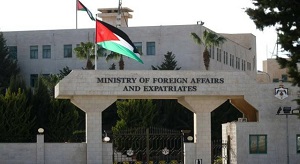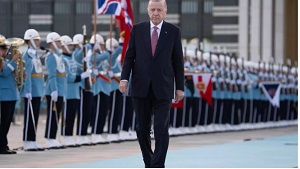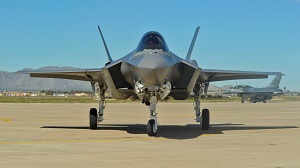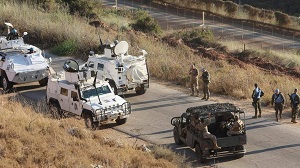Israeli settlers’ ongoing ‘cycle of terror’ - By Najla M. Shahwan , The Jordan Times
Israeli settlers torched a mosque and scrawled graffiti across its walls in the occupied West Bank on 13 November, the latest in a surge of increasingly brazen attacks on Palestinians.
The Ministry of Awqaf and Religious Affairs said the Hajjah Hamidah Mosque in Salfit, northern West Bank, was set alight and defaced in what it called “a heinous crime and a blatant assault on the feelings of Muslims”.
“The attack resulted in parts of the mosque being set on fire and defaced with racist graffiti by settler gangs, who carry out daily assaults on Islamic holy sites and citizens’ properties amid a systematic escalation in both the frequency and nature of these violations,” the ministry said.
Salfit and other areas across the West Bank have witnessed a sharp escalation in settler and military attacks since the events of 7 October 2023.
On 11 November, dozens of masked settlers attacked the villages of Beit Lid and Deir Sharaf, torching vehicles and property and wounding four Palestinians. Two days earlier, a Palestinian man was killed and 17 others, including foreign activists, injured when settlers stormed the outskirts of Abu Falah, north-east of Ramallah, and set a home ablaze.
According to the Palestinian Authority’s Colonisation and Wall Resistance Commission (CWRC), Israeli forces and settlers carried out 2,350 attacks across the West Bank last month in what it described as an “ongoing cycle of terror”.
B’Tselem, the Israeli human rights group, reported on 10 November that settlers were attacking Palestinians “daily”, including “shooting, beating and threatening residents, throwing stones, torching fields, destroying trees and crops, stealing produce, blocking roads, invading homes, and burning cars”.
The UN also warned of a dramatic rise in settler violence, recording 264 settler attacks in October — the highest monthly figure in nearly two decades. “That’s the highest monthly toll in nearly two decades of record-keeping, averaging more than eight incidents every single day since 2006,” UN spokesperson Farhan Haq said, citing data from OCHA.
Harvest season under assault
This year’s olive harvest has been among the most violent on record, with extremist settlers intensifying attacks on farmers and international volunteers. Israel has even deported some American citizens who attempted to accompany and protect harvesters.
On 10 October, a veteran AFP photographer documenting the harvest was beaten with sticks by settlers, who stoned his car and set it alight. Israeli forces reportedly refused to intervene, instead firing rubber bullets and tear gas at olive pickers and activists. On 8 November, dozens of settlers beat a female Reuters journalist, leaving her with serious injuries, according to the Foreign Press Association (FPA).
"The Foreign Press Association is appalled by recent attacks by Israeli settlers against journalists while reporting in the occupied West Bank and calls on Israeli authorities to halt this violence immediately,” the organisation said, noting that journalists had become “a clear target” as they documented unprecedented levels of unchecked violence during the harvest.
Palestinian farmers and foreign activists have also faced sustained assault while working in villages such as Burin, Furush Beit Dajan and Deir Jarir, where settlers have vandalised groves and cut down olive trees. According to the CWRC, Palestinian olive pickers have been attacked at least 259 times since the harvest began in October.
More than 4,000 olive trees and saplings have been vandalised this season, OCHA reports.
The olive tree is a cultural and economic lifeline for Palestinians, with as many as 100,000 families depending on the harvest. Ajith Sunghay, head of OHCHR’s office in the occupied territory, described it as “the economic backbone of rural Palestinian communities”. “The olive here is never just a tree. It is livelihood and lineage, resilience and economy, and a historic vein connecting Palestinians to the land,” he said.
Violence has surged in the West Bank since the Gaza war began in October 2023, with more than 1,000 Palestinians killed by Israeli forces and settlers. Israeli political overtures towards annexation have further emboldened settlers to seize land through force.
Around 700,000 Israeli settlers now live in the West Bank and East Jerusalem, territory earmarked by Palestinians for a future state. These settlements are considered illegal under international law. Over the past year alone, 84 new settler outposts have been erected, often appearing overnight. Although illegal under Israeli law, many are later retroactively authorised and expanded into permanent settlments protected by the army.
The line between settlers and soldiers is increasingly blurred, with many settlers serving in military units tasked with guarding the very settlements in which they live.
In Turmus Ayya, north of Ramallah, the Israeli military fired tear gas at farmers and international activists attempting to reach their olive groves, pushing them towards armed settlers. Activists described the move as deliberate.
In August, the army bulldozed 3,000 olive trees in Al Mughayyir, citing security concerns. Settlers then constructed a new Israeli-only road on the cleared land. Three new outposts have since been established around the village, effectively encircling it.
Palestinians are now barred from accessing groves near these outposts. Israeli army forces Palestinians to remain 200 metres from settlements, with those who cross the boundary facing arrest. Farmers with land near settlements must apply for special harvest permits, few of which are ever granted.
In July, the International Court of Justice issued a landmark opinion declaring Israel’s occupation of Palestinian territory illegal and calling for the evacuation of all settlements in the West Bank and East Jerusalem.
Latest News
-
 Jordan condemns Israeli minister’s calls to target Palestinian leadership
Jordan condemns Israeli minister’s calls to target Palestinian leadership
-
 Turkey seeks to host next COP as co-presidency plans falter
Turkey seeks to host next COP as co-presidency plans falter
-
 ‘Israel’ open to US F-35 sale to Saudi if it brings normalization: Axios
‘Israel’ open to US F-35 sale to Saudi if it brings normalization: Axios
-
 "Israeli tank fires near our forces in Lebanon," UNIFIL
"Israeli tank fires near our forces in Lebanon," UNIFIL
-
 King meets with Pakistan PM in Islamabad, emphasises importance of expanding cooperation
King meets with Pakistan PM in Islamabad, emphasises importance of expanding cooperation